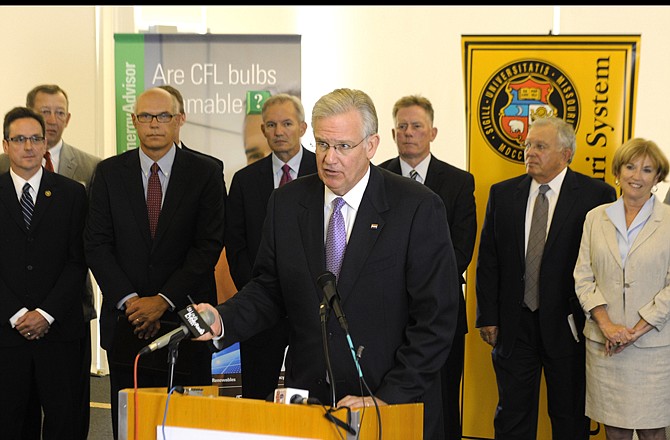COLUMBIA - The technology is unproven, the financing undetermined and the market prospects unclear. But those uncertainties aren't preventing a phalanx of Missouri business and political heavyweights from lining up behind a next-generation nuclear energy project that Gov. Jay Nixon hopes will help define the Show-Me State much like the American auto industry helped elevate Detroit.
Flanked at a Monday afternoon news conference by more than 20 statewide business leaders, utility executives and fellow politicians on the University of Missouri campus, Nixon on Monday hailed a plan to build small modular nuclear reactors. The effort is the potential "spark (of) a new global industry" that would not only benefit the state's power supply but also create portable power units that could be shipped overseas or elsewhere in the United States, he said.
Westinghouse Electric Co. and Ameren Missouri are competing with several applicants for a share of $452 million the U.S. Department of Energy has set aside to help design and develop the new technology. Top executives from those companies joined Nixon and spoke later in the day to an overflow crowd of more than 300 people at the university's Life Sciences Center at an event billed as the "Missouri Economic Development Summit."
Other speakers included University of Missouri system President Tim Wolfe and Columbia campus Chancellor Brady Deaton.
The school, along with Missouri University of Science & Technology in Rolla, will aid in the project's research and development.
"We have an opportunity to create a new industry from the ground up, and this new industry means unlimited potential for sustainable jobs and economic growth," said Kate Jackson, a senior vice president and chief technology officer at Westinghouse.
The federal department plans to announce its grant recipients as soon as September. The federal support, which involves a 50-50 cost-sharing arrangement, is necessary for the project to proceed, participants said. Two recipients will share the money.
"Designing and licensing a nuclear power plant requires large investments, and long development time," Jackson said. "A new market really needs a public-private partnership."
St. Louis-based Ameren wants to build and operate up to five smaller reactors at its central Missouri plant near Fulton. The Callaway County plant is the state's only nuclear reactor.
Several speakers said the combined firepower of the two companies, along with the strong support from state and local officials and the business community, could give Missouri the necessary edge to prevail. Getting licensing approval from the federal Nuclear Regulatory Commission - or being first to market - is vital, Jackson said.
Project backers cited several advantages to the modular design. The smaller reactors generate about 225 megawatts of power, or less than one-fourth the energy generated by a traditional nuclear reactor. The smaller size makes the reactors more affordable, easier to build - two years compared with the five- or 10-year construction cycle - and more likely to pass regulatory muster. The smaller reactors would appeal to smaller utilities that don't have the space or the power grid capacity for a traditional reactor, speakers said.
Other utility companies expected to compete for the federal support include NuScale Power of Corvallis, Ore., which would build the reactors at the Savannah River nuclear site in South Carolina. Gen4 Energy of Denver, which has developed a 25 megawatt reactor, said in late April that it wouldn't pursue the federal project after initially expressing interest.
Opponents of the Missouri project include the Missouri Coalition for the Environment. Edward Smith, the group's safe energy director, said the proposal relies heavily on taxpayer support because the private sector has already made up its mind about nuclear energy.
"The nuclear industry needs ratepayers and taxpayers because Wall Street lost billions decades ago financing new nuclear reactors and has since given up," he said. "And the insurance industry sees nuclear reactors as too risky to insure, leaving taxpayers on the hook in the case of Fukushima or Chernobyl-like disaster."
In addition, a recent federal appeals court ruling that chided the Nuclear Regulatory Commission over its plans to store radioactive, spent fuel muddies future decisions, he said.
"A lot of question marks on the whole small modular reactor proposal have not really been addressed," he said.

